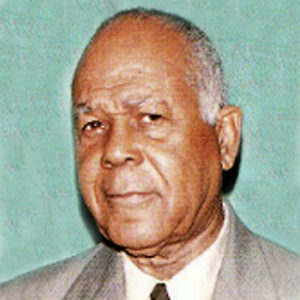
Henry McBay
Henry Ransom Cecil McBay, a black scientist and educator, was born on this date in 1914. He was from Mexia, TX.
He received a Bachelor of Science from Wiley College in 1934, a Master of Science from Atlanta University in 1936, and a Doctor of Philosophy from the University of Chicago in 1945. He taught chemistry at Wiley College from 1936 to 1938 and then at Western University, Kansas City. In 1944 and 1945, he won the Elizabeth Norton Prize at the University of Chicago for outstanding research in chemistry.
Four years later, he was awarded a $5,000 grant from the Research Corp. of New York for research on chemical compounds. A compound is a chemical substance formed from two or more elements, with a fixed ratio determining the composition. For example, dihydrogen monoxide (water, H2O) is a compound of two hydrogen atoms for every oxygen atom.
Generally, this fixed ratio must be fixed due to some physical property rather than an arbitrary man-made selection. This is why materials such as brass, the superconductor YBCO, the semiconductor aluminum gallium arsenide, or chocolate are considered mixtures or alloys rather than compounds. A defining characteristic of a compound is that it has a chemical formula. Formulas describe the ratio of atoms in a substance and the number of atoms in a single molecule of the substance.
The formula does not indicate that a compound is composed of molecules; for example, sodium chloride (table salt, NaCl) is an ionic compound. Compounds may have several possible phases. Most can exist as solids, and molecular compounds may also exist as liquids or gases. If heated to a certain temperature (called the decomposition temperature), all compounds will decompose to smaller compounds or individual atoms.
McBay served as a technical expert on a United Nations Educational, Scientific, and Cultural Organization mission to Liberia in 1951. He was the first recipient of research funding from George Washington Carver's donation to the Tuskegee Institute for research on extracting fibers from okra. He found the process impossible and "researched me out of a job," he said.
From 1945 to 1981, McBay was a member of the teaching faculty at Morehouse College, beginning as an instructor and advancing to full professor. Professor McBay served as chairman of the Department of Chemistry for 11 years. He was appointed Fuller E. Callaway Professor of Chemistry at Atlanta University in 1982 and became emeritus of chemistry at Clark Atlanta University in 1986. More than 45 of his students went on to receive doctorates in chemistry. He has published numerous articles in scientific journals.
Dr. McBay was assistant director of the Program for Research Integration and Support for Matriculation to the Doctorate at Clark Atlanta University. He continued teaching chemistry until his death in July 1995.
Created Equal The Lives and Ideas of Black American Innovators
By James Michael Brodie
Copyright 1993, by Bill Adler Books, Inc.
William Morrow and Co. Inc., New York
ISBN 0-688-11536-5